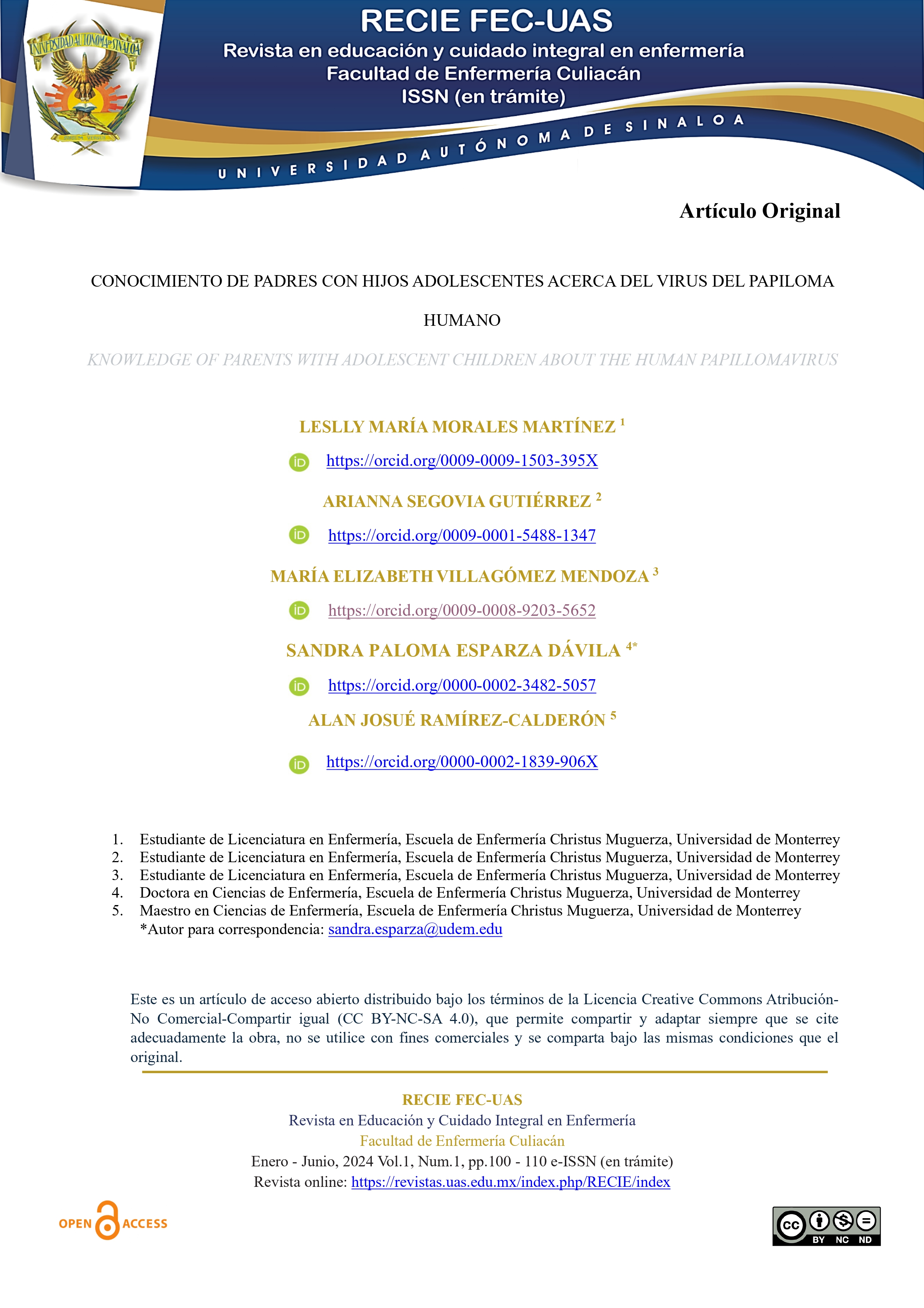Knowledge of parents with adolescent children about the human papillomavirus
Keywords:
Virus de Papiloma Humano, conocimiento, padres, adolescentes, Infección de Trasmisión SexualAbstract
Introduction: Human Papillomavirus (HPV) infection is a current public health problem that affects around 60% of the population of Mexico, being an incurable but treatable condition obtained through sexual transmission, manifesting through Genital warts, in both men and women. HPV infection is caused by a virus that has a DNA genome belonging to the Papillomaviridae family, which is spread through vaginal, anal or oral sex. Objective: Identify the level of knowledge of parents with adolescent children about the Human Papillomavirus. Methodology: Descriptive study, not probabilistic for convenience. Sample of 35 parents/guardians of adolescents between 12 and 19 years old. Information was collected through a sociodemographic data questionnaire and the knowledge and awareness of HPV instrument. Results: The knowledge of parents with adolescent children about HPV is a low level with a mean of 10.66, answering the following questions correctly: genital warts are caused by HPV (94.3%), multiple sexual partners increase the risk of contracting the HPV (82.9%). In relation to the sex of the parents, an average of 11.14 was obtained in women, in terms of age, an average of 11.50 was identified in the range of 51 to 60 years. At the educational level, the university obtained an average of 11.86 and the number of children, 1 or 2 children, obtained an average of 11.08. Conclusions: Parents of adolescent’s lack knowledge about HPV, while mothers are more informed due to their active role in child care.
Downloads
References
Cámara De Diputados Del H. Congreso De La Unión. (2014). Reglamento de La Ley General de Salud en Materia de Investigación para la Salud. Cámara de diputados. https://www.diputados.gob.mx/LeyesBiblio/regley/Reg_LGS_MIS.pdf
Esparza-Dávila, S., P. (2017). Rol de los padres para la prevención del virus del papiloma humano en adolescentes. [Tesis doctoral, Universidad Autónoma de Nuevo León]. Repositorio institucional de la Universidad Autónoma de Nuevo León. http://eprints.uanl.mx/16899/1/1080289850.pdf
Herrera, J. (2012). Educación y conocimiento: el problema del conocer en la escuela. Sophia, Colección de Filosofía de la Educación, 12 231-250. https://www.redalyc.org/pdf/4418/441846102010.pdf
Juárez-González, K., Paredes-Cervantes, V., & Martínez-Salazar, M., Gordillo-Rodríguez, S., Vera-Arzave, C., Martínez, M., Sánchez-Suárez, P., & Vázquez-Vega, S. (2020). Prevalencia del virus del papiloma humano oncogénico en pacientes con lesión cervical. Revista Médica del Instituto Mexicano del Seguro Social, 58(3), 243-249. https://doi.org/10.24875/RMIMSS.M20000027
Jurado, C., & Acosta, L. (2017). Nivel de conocimiento de madres, padres y/o cuidadores sobre el Virus de Papiloma Humano (VPH) y su influencia en la cobertura de vacunación. Barrio San Roque y Aledaños, 2017. Revista de Salud Pública, 24(1), 33-44. https://doi.org/10.31052/1853.1180.v24n1
López, N., Salamanca, I., Vergés, E., Suárez, E., Sánchez, A., López, A. B., Panizo-Santos, M. B., Garcés-Sánchez, M., Montesdeoca, A., Rivera, A. J. & Suárez, M. (2021). Factors influencing HPV knowledge and vaccine acceptability in parents of adolescent children: results from a survey-based study (KAPPAS study). Taylor & Francis Online, 18(1) 1-11. https://doi.org/10.1080/21645515.2021.2024065
Lugo, M. G., (2022, 5 de septiembre). En pleno siglo XXI, hablar de sexualidad aún es un tema tabú. Gaceta UNAM. https://www.gaceta.unam.mx/en-pleno-siglo-xxi-hablar-desexualidad-aun-es-un-tema-tabu/
Luna-Chairez, P., Marín-Guevara T. G., Prieto-Robles, N. E. (2021). Conocimiento y aceptación de la vacuna VPH por padres de estudiantes de primaria. Salud y Administración, 8(22), 15-23. https://revista.unsis.edu.mx/index.php/saludyadmon/article/view/204/156
McPartland, T., Weaver, B., Lee, S., & Koutsky, L. (2005). Men’s Perceptions and Knowledge of Human Papillomavirus (HPV) Infection and Cervical Cancer. Journal of American College Healt, 50(5) 225-230. https://doi.org/10.3200/JACH.53.5.225-230
Medina-Fernández, I. A., Gallegos-Torres, R. M., Cerver-Bass, M. E., Cob-Tejeda, R. A., Jiménez-Laces, J. & Ibarra-Escobedo, O. (2017). Conocimiento del virus del papiloma humano y su vacuna por parte de mujeres de una zona rural de Querétaro, México. Revenf, 32, 1-14. https://revistas.ucr.ac.cr/index.php/enfermeria/article/view/23575/27298
Montalvo, J., Espinosa, M. R. & Pérez, A. (2013). Análisis del ciclo vital de la estructura familiar y sus principales problemas en algunas familias mexicanas. Pepsic, 17(28), 73-91. http://pepsic.bvsalud.org/pdf/alpsi/v17n28/n28a07.pdf
Sánchez-Mendoza, R. D., Orozco-Gómez, C., Amaro- Hinojosa, M. D. & Jiménez-Vázquez, V. (2023). Conocimiento, creencias y aceptabilidad de la vacuna contra el Virus del Papiloma Humano en padres de Chihuahua, México. Revista Cuidarte, 14(3). http://dx.doi.org/10.15649/cuidarte.3160
Salazar-Campos, A. & Reyes-Silva, J. A. (2020). Conocimiento y factores de riesgo del virus del papiloma humano en adolescentes. UNO Sapiens, 4, 7-11. https://repository.uaeh.edu.mx/revistas/index.php/prepa1/article/view/5114/6589
Wiesner, C., Piñeros, M., Trujillo, L. M., Cortés, C. & Ardila, J. (2010). Aceptabilidad de la vacuna contra el Virus Papiloma Humano en padres de adolescentes, en Colombia. Salud Pública, 12(6) 961-973. https://www.scielosp.org/pdf/rsap/2010.v12n6/961-973
Yacobi, E., Tennat, C., Ferrante, J., Pal, N., & Roetzheim, R. (1999). University students’ knowledge and awareness of HPV. Preventive Medicine, 28(6), 535-541. https://doi.org/10.1006/pmed.1999.0486

Downloads
Published
Issue
Section
License
Copyright (c) 2024 RECIE FEC-UAS Revista de educación y cuidado integral en enfermería Facultad Enfermería Culiacán

This work is licensed under a Creative Commons Attribution-NoDerivatives 4.0 International License.

